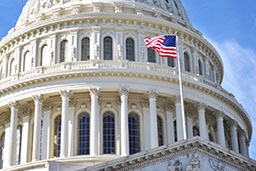This week, Democrats in the U.S. House of Representatives introduced the HEROES ACT, a new $3T coronavirus stimulus package that, if passed, will grant further economic relief—this time to a wide array of industries and Americans still suffering from the impact of COVID-19. The House official government website has posted the proposed bill, which can be found here. For those who would rather not read the 1,815-page legislation, which is expected to meet with plenty of Republican opposition in the Senate, Michelman & Robinson summarizes the major provisions below.
Q. What is the HEROES Act?
A. The Health and Economic Recovery Omnibus Emergency Solutions (HEROES) Act is a bill pending in the House designed to provide another round of federal stimulus—totaling approximately $3T— to certain sectors of the U.S. economy and communities devastated by COVID-19. The HEROES Act includes:
- Economic influx and additional relief for workers
- Provisions relating to health care, Medicaid, Medicare, and insurance
- Retirement and pension plan relief
- Continued unemployment assistance
- Assistance to the agricultural industry
- Further small business assistance
- Support for essential workers
- Assistance to renters and homeowners; protection for the homeless; student loan forgiveness; medical equipment for first responders; support for small, minority-owned, and non-profit businesses; and other assistance, including a nod to legal cannabis-related businesses (all pursuant to the COVID-19 HERO Act, which is part of the overall legislation)
- Further paid sick leave and community support
- Data support for telecommuting
- Additional higher education provisions
- A “COVID-19 HEROES Fund”
- Child nutrition programs
- A slew of miscellaneous provisions
Q. Does the HEROES Act replace the CARES Act?
A. No, the proposed bill would create an additional bucket of stimulus funds on top of the $2T already allocated to businesses and individuals as part of the CARES Act. Notwithstanding the relief provided by way of the CARES Act, many Americans and businesses continue to struggle in the wake of the coronavirus pandemic, and unemployment is at record highs. That being said, the HEROES Act would extend certain programs provided for by the CARES Act, and offer further assistance as well.
Q. How would the $3T contemplated under the HEROES Act be allocated?
A. If the legislation, as written, were to become law, $3T would be allocated as follows (according to the current draft of the bill and press release issued by the House Committee on Appropriations):
- $1T to state, local, territorial, and tribal governments to pay essential workers such as first responders, health workers, and teachers, among others who are in danger of losing their jobs
- $200B for a “COVID-19 HEROES Fund” to ensure essential workers receive hazard pay
- $75B to be set aside for testing, contact tracing, and isolation measures in addition to support for hospitals and coronavirus treatment providers
- Additional direct economic impact payments to U.S. citizens (up to $1,200 per family member/$6,000 per household)
- Enhancements to the Employee Retention Credit to further encourage employers to keep employees on payroll
- New requirements for OSHA to issue an enforceable standard within seven days of enactment to (1) require all workplaces to implement infection control plans based on CDC guidance and (2) prevent employers from retaliating against workers who report infection control issues
- Further strengthening to the PPP to make sure underserved communities and non-profits of all sizes can get their hands on loans, and an extra $10B for COVID-19 emergency grants through the EIDL program
- COBRA subsidies to protect Americans losing their employer-provided health insurance and the creation of a special enrollment period in the ACA exchanges for uninsured Americans
- $600/week in federal unemployment payments through January 2021 to unemployed Americans
- $175B in new stimulus to help renters and homeowners make monthly rent, mortgage, and utility payments and manage other housing-related costs
- 15% increase to the maximum SNAP benefit, along with additional funding for nutrition programs to strengthen food security and help families put food on their tables
- New resources that will work to ensure safe elections and an accurate census and preserve the U.S. Postal Service (to the tune of $25B), all in an effort to safeguard our democracy
Q. Why have House Democrats proposed another round of relief so soon?
A. In short, because the U.S. economy is in peril and Americans are feeling the financial impact of COVID-19 now more than ever. House Speaker Nancy Pelosi defended the cost of the HEREOS Act, declaring “we intend to use [current] low interest rates to bolster the American people. We must think big for the people now, because if we don’t, it will cost more lives and livelihood later. Not acting is the most expensive course.” Speaker Pelosi has emphasized that the need for relief is “monumental” and that the bill will prioritize “opening our economy safely and soon, honoring our heroes, and the putting much needed money in the pockets of Americans.”
Again, the legislation has a long road ahead in the Senate, where many Republicans have already made clear that they do not see an immediate need for a third relief package so soon. In fact, Senate Majority Leader Mitch McConnell, commenting on the massive debt in the U.S., remarked that we should “hit pause” on coronavirus relief, for now.
Q. When will the bill be voted on?
A. Democrats intend to bring a vote in the House as early as tomorrow (Friday, May 15). If passed there, the bill will head to the Senate.
M&R will continue to monitor the progress of the HEROES Act as it moves through Congress, and will provide updated information as it becomes available.
This blog post is not offered, and should not be relied on, as legal advice. You should consult an attorney for advice in specific situations.

